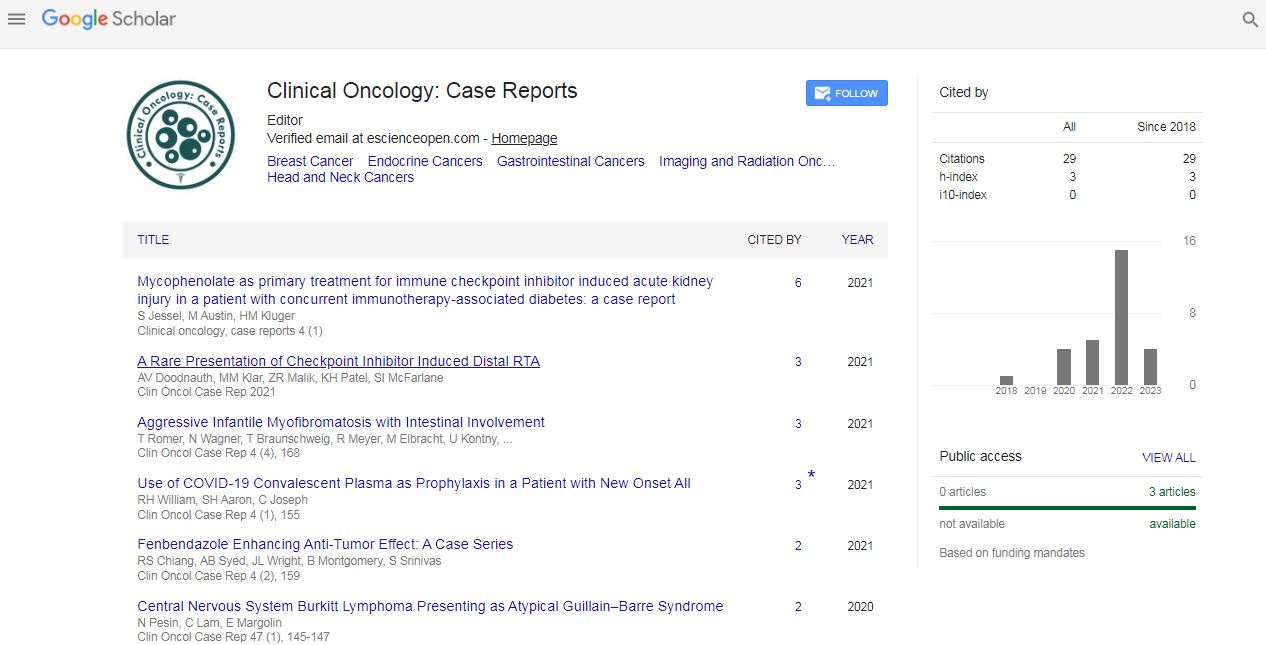Perspective, Cocr Vol: 7 Issue: 3
Knowing Causes, Diagnosis, and Treatment Options for Lung Carcinoma
Ravina Johns*
The Affiliated University of Pennsylvania
*Corresponding Author: Ravina Johns
The Affiliated University of Pennsylvania
E-mail: johnsrv@hotmail.com
Received: March 05, 2024; Manuscript No: COCR-24-132145
Editor Assigned: March 11, 2024; PreQC Id: COCR-24-13145 (PQ)
Reviewed: March 18, 2024;
QC No: COCR-24-13145 (Q)
Revised: March 25, 2024; Manuscript No: COCR-
24-132145 (R)
Published: March 29, 2024; DOI: 10.4173/cocr.7(3).339
Citation: Johns R., (2024) Knowing Causes, Diagnosis, and Treatment Options for Lung Carcinoma Clin Oncol Case Rep 7:3
Abstract
One of the biggest causes of cancer-related mortality globally is still lung carcinoma, a kind of cancer that starts in the lungs. This page offers a thorough overview of lung cancer, examining its causes, risk factors, modes of diagnosis, and modes of therapy. Healthcare providers and patients can make educated decisions about prevention, early detection, and individualized treatment plans by being aware of the intricacies of this illness
Keywords: Biomarkers; Targeted therapies; Personalized medicine; Genomics; Clinical trials; Pharmacogenomics; Patient stratification; Data analytics; The healthcare revolution
Introduction
Lung carcinoma, also referred to as lung cancer, is a type of cancerous tumor that starts in the lungs. It starts when aberrant cells proliferate out of control and have the potential to eventually infiltrate surrounding tissues and spread to other areas of the body. Lung cancer is a major global public health concern because of its high death rate, which is a result of late-stage diagnosis and few available treatment choices. The purpose of this page is to clarify lung carcinoma’s causes, risk factors, diagnosis, and available treatment options.
Causes and Risk Factors
Lung cancer is a complex disease whose onset is influenced by a number of genetic, environmental, and lifestyle variables. Smoking cigarettes is the main cause of lung cancer, making up about 85% of cases. Many carcinogens included in tobacco smoke harm lung cells’ DNA, causing mutations that encourage the spread of cancer. In addition, the risk of lung cancer is greatly increased by exposure to environmental contaminants such asbestos, radon, and air pollution. A family history of lung cancer, prior chest radiation therapy, and specific genetic predispositions are additional risk factors.
Types of Lung Carcinoma
Non-small Cell Lung Cancer (NSCLC) and Small Cell Lung Cancer (SCLC) are the two primary subtypes of lung carcinoma. Adenocarcinoma, squamous cell carcinoma, and large cell carcinoma are the three subtypes of Non-small cell Lung Cancer (NSCLC), which makes up around 85% of all instances of lung cancer. The most prevalent variety, adenocarcinoma, usually develops in the outer areas of the lungs. Large cell carcinoma can form anywhere in the lung, whereas squamous cell carcinoma starts in the bronchial tubes. Approximately 15% of cases are SCLC, which is distinguished by its aggressiveness and propensity for fast metastasis.
Diagnosis
Usually, a combination of imaging examinations, lab testing, and tissue collection is used to diagnose lung cancer. Computed Tomography (CT) scans and chest X-rays are frequently used to see abnormalities in the lungs, like tumors or nodules. (PET) Positron Emission Tomography scans can be used to determine how far cancer has spread. In addition, bronchoscopy with biopsy and sputum cytology are used to check lung tissue for cancer cells. It is also possible to perform molecular testing on tumor samples to find certain genetic alterations that can help guide therapy choices. Treatment Approaches: These quantifiable markers of biological processes or states can be used to track the effectiveness of treatment, identify illnesses, and forecast the likelihood of developing diseases.
Treatment Approaches
The type and stage of the cancer, the patient’s preferences, and general health all have a role in how lung carcinoma is managed. Among the possible treatment options include immunotherapy, targeted therapy, radiation therapy, chemotherapy, and surgery. For early-stage NSCLC, surgical resection is frequently advised with the goal of removing the tumor and surrounding tissue. Data Analytics: Genomics and clinical data are subjected to extensive dataset analysis, pattern recognition, and relevant insight extraction using sophisticated computational tools and algorithms. Chemotherapy is used to eradicate cancer cells and stop them from proliferating, either by itself or in conjunction with other medicines. High-energy beams are delivered to the tumor site during radiation therapy, killing cancer cells with the least amount of harm to the surrounding healthy tissue. While immunotherapy strengthens the body’s immune response to combat and eradicate cancer cells, targeted therapy medications are made to specifically target molecular abnormalities in cancer cells.
Conclusion
The high rates of morbidity and mortality associated with lung carcinoma make it an extremely difficult cancer to cure, and better preventive, early detection, and treatment approaches are desperately needed. Healthcare practitioners can use focused treatments to reduce risk and enhance patient outcomes by having a thorough grasp of the intricate interactions between genetic, environmental, and lifestyle factors that contribute to the development of lung cancer. Sustained investigation into cutting-edge therapeutic modalities, such as immunotherapy and precision medicine, has the potential to improve lung cancer treatment and eventually lessen the disease’s impact on patients and society at large.
 Spanish
Spanish  Chinese
Chinese  Russian
Russian  German
German  French
French  Japanese
Japanese  Portuguese
Portuguese  Hindi
Hindi 